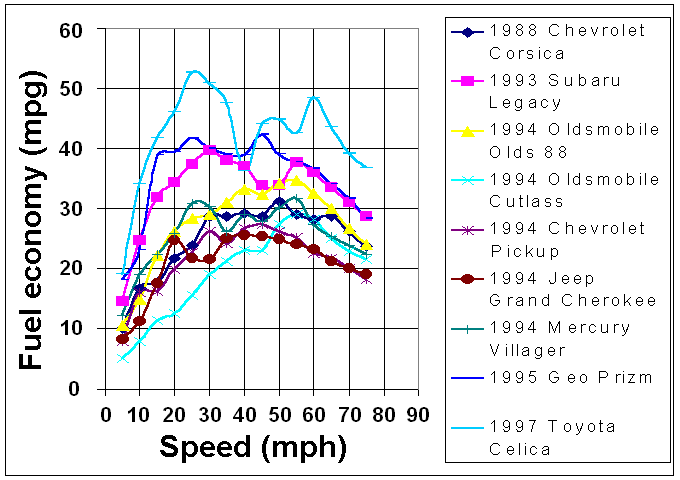you can hop them up but they have a couple of shortcomings. Nobody builds hotrod pumps here, you end up with European builders who are a bit pricey... the pumps don't have a huge reserve built in but are quite adequate for their design. The pump elements aren't big enough from the factory to move enough fuel to make huge HP numbers like you would need for a 12 in a 4000 pound car. A hotrodded pump can reach or exceed the price of a used Cummins here and the MB guys who beat on the OM617 kind of indicate you're on borrowed time after 300 hp. When you think about what it was designed for, that's pretty significant in it's own. I think some of the original non-turbo models where what, 88 hp?
SBG on here has done some homework on the Isuzu mills, some of which are very much like a 4BT cummins. My favorite Isuzu buildup is this one:
He implied that he was getting 30 or so mpg and it probably made enough snot with the compounds to get it into the 12's. It won't be cheap unless you know folks to get parts from or have good fab skills or both, and then "cheap" is a flexible term.
If I wanted to get close to your goals, I think I would get an LS, all the sensors, and the transmission out of a rolled truck / suv. A 6.0 or 6.2 would help gas mileage and run pretty strong out of the box. They're big enough to make torque like an American V8 should, but not so big you have to feed it with a garden hose sized fuel line. It'd be a fair amount of work. Look at SilverBuick or Matt Cramer's threads for a primer on what it takes for sensors. There's something like 120 pins on an ODBii computer and on a GM I think you have to get the body computer (BCM) as well for the transmission? I could be wrong there.
On a mechanical diesel, you need some wires too. Alternator and starter... maybe a glow plug relay and fuel solenoid (kill switch) if you get all fancy... and a big budget for transmissions and a rear end. I would take a bunch of measurements as I kind of question whether the NV3550 will fit in the tunnel. Speedway has a decent catalog for roundy-round dirt car stuff like hydraulic clutch pedals. I'm not real sure how well you will like trying to speed shift that trans.
On the easier to do, doesn't leave your car on blocks forever end of the scale, you could probably find a 200-4R overdrive and try to find some higher numeric gears for the rear and it would be a good start. The lower gears would help it accelerate around town. You wouldn't have to lean on the gas as hard to get it moving. The OD theoretically could help on the highway, depending on how carried away you got with the rear gear.. For the money, I think it would be the most effective start. You will "feel" the gears immediately.
SBG on here has done some homework on the Isuzu mills, some of which are very much like a 4BT cummins. My favorite Isuzu buildup is this one:
He implied that he was getting 30 or so mpg and it probably made enough snot with the compounds to get it into the 12's. It won't be cheap unless you know folks to get parts from or have good fab skills or both, and then "cheap" is a flexible term.
If I wanted to get close to your goals, I think I would get an LS, all the sensors, and the transmission out of a rolled truck / suv. A 6.0 or 6.2 would help gas mileage and run pretty strong out of the box. They're big enough to make torque like an American V8 should, but not so big you have to feed it with a garden hose sized fuel line. It'd be a fair amount of work. Look at SilverBuick or Matt Cramer's threads for a primer on what it takes for sensors. There's something like 120 pins on an ODBii computer and on a GM I think you have to get the body computer (BCM) as well for the transmission? I could be wrong there.
On a mechanical diesel, you need some wires too. Alternator and starter... maybe a glow plug relay and fuel solenoid (kill switch) if you get all fancy... and a big budget for transmissions and a rear end. I would take a bunch of measurements as I kind of question whether the NV3550 will fit in the tunnel. Speedway has a decent catalog for roundy-round dirt car stuff like hydraulic clutch pedals. I'm not real sure how well you will like trying to speed shift that trans.
On the easier to do, doesn't leave your car on blocks forever end of the scale, you could probably find a 200-4R overdrive and try to find some higher numeric gears for the rear and it would be a good start. The lower gears would help it accelerate around town. You wouldn't have to lean on the gas as hard to get it moving. The OD theoretically could help on the highway, depending on how carried away you got with the rear gear.. For the money, I think it would be the most effective start. You will "feel" the gears immediately.



Comment